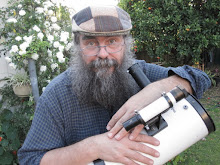Wednesday, May 13, 2015
The Sky This Week - Thursday May 14 to Thursday May 21
The New Moon is Monday May 18. Venus
is prominent in
the twilight evening sky and is visited by the crescent Moon on the 21st. Jupiter is the
brightest object in the evening sky once Venus has set. Saturn is in the
head of the Scorpion and is easily visible in the evening. Mercury is difficult to view in the twilight. Comet C/2015 G2 MASTER is visible in binoculars in the evening.
The New Moon is Monday May 18. The Moon is at perigee, when it is closest to the Earth, on the 15th.
Evening sky on Tuesday May 19 looking west as seen from Adelaide at 17:55 (5:55 pm) ACST in South Australia. Venus is obvious in the early evening sky. Mercury is just on the horizon cloe to the crescent Moon. Similar views will be seen elsewhere at the equivalent local time (click to embiggen).
Venus is easy to see above the western horizon in the twilight. At nautical twilight, an hour after sunset, it is around two hand-spans above the horizon, and still visible at astronomical twilight.
During the week Venus draws closer to the stars Castor and Pollux, heading for a meeting with Jupiter later next month. On the 21st the crescent Moon is close to Venus, forming a triangle with Venus and Pollux.
Mercury is low in the western evening sky and difficult to see in the twilight. On the 19th it and the crescent Moon are close, but you will need a flat level horizon like the ocean to see them.
Mars is lost in the twilight.
Early evening sky on Thursday May 21 looking north-west as seen from Adelaide at 18:30 ACST showing Venus, the crescent Moon and Jupiter. Jupiter is the brightest object above the north-western horizon once Venus has set. (click to embiggen).
Jupiter is easily seen in the evening sky. It is the brightest object above the northern horizon when twilight ends, and continues into the north-western sky as the night goes on. It is between the bright star Regulus in the sickle of Leo (this forms the head of the constellation of the Lion) and Pollux in Cancer. It is also not far from the rather nice Beehive cluster in Cancer, and looks very good in binoculars. Jupiter, Venus and Pollux form a line in the sky.
Jupiter was at opposition, when it is biggest and brightest in our sky, on 7 February, but it will be an excellent object for many weeks to come. Jupiter is visible for most of the night, setting just before 11 pm, and is high enough for telescopic observation once twilight is over. Jupiter's Moons will be putting on a good display in both binoculars and small telescopes.
Evening sky on Saturday May 16 looking east as seen from Adelaide at 21:00 ACST. Saturn is easily visible above the horizon in the head of the Scorpion. The inset shows the telescopic view of Saturn at this time. (click to embiggen).
Saturn is now easily visible around 9 pm near the head of the constellation of the Scorpion not far from the bright red star Antares. The sight of the distinctive constellation of the Scorpion curled above the horizon, with bright Saturn in its head, is very nice indeed.
While Saturn is readily visible from around 20:00, it is best for telescope observation from around 22:00 into the morning hours.
The evening sky at 18:55 (6:55 pm ACST) looking west as seen from Adelaide on 14 May. The location of comet C/2015 G2 MASTER is shown with a circle. You will probably need binoculars to see it. Similar views will be seen elsewhere in Australia at equivalent local times. (click on image to embiggen).
Comet C/2015 G2 Master is now in the evening sky and high enough above the horizon to be readily seen. It should be around magnitude 6, just on the threshold of unaided eye visibility, but is best viewed with binoculars and telescopes. In binoculars the comet will be a fuzzy blob, and decent telescopes may show the thin tail see in astrophotographs.
The comet will move rapidly up through Lepus heading for Canis Major this week. A spotters map suitable for printing in black and white is here.
There are lots of interesting things in the sky to view with a telescope. Especially with Jupiter, Venus and Saturn in the sky. If you don't have a telescope, now is a good time to visit one of your local astronomical societies open nights or the local planetariums.
Printable PDF maps of the Eastern sky at 10 pm AEST, Western sky at 10 pm AEDST. For further details and more information on what's up in the sky, see Southern Skywatch.
Cloud cover predictions can be found at SkippySky.
The New Moon is Monday May 18. The Moon is at perigee, when it is closest to the Earth, on the 15th.
Evening sky on Tuesday May 19 looking west as seen from Adelaide at 17:55 (5:55 pm) ACST in South Australia. Venus is obvious in the early evening sky. Mercury is just on the horizon cloe to the crescent Moon. Similar views will be seen elsewhere at the equivalent local time (click to embiggen).
Venus is easy to see above the western horizon in the twilight. At nautical twilight, an hour after sunset, it is around two hand-spans above the horizon, and still visible at astronomical twilight.
During the week Venus draws closer to the stars Castor and Pollux, heading for a meeting with Jupiter later next month. On the 21st the crescent Moon is close to Venus, forming a triangle with Venus and Pollux.
Mercury is low in the western evening sky and difficult to see in the twilight. On the 19th it and the crescent Moon are close, but you will need a flat level horizon like the ocean to see them.
Mars is lost in the twilight.
Early evening sky on Thursday May 21 looking north-west as seen from Adelaide at 18:30 ACST showing Venus, the crescent Moon and Jupiter. Jupiter is the brightest object above the north-western horizon once Venus has set. (click to embiggen).
Jupiter is easily seen in the evening sky. It is the brightest object above the northern horizon when twilight ends, and continues into the north-western sky as the night goes on. It is between the bright star Regulus in the sickle of Leo (this forms the head of the constellation of the Lion) and Pollux in Cancer. It is also not far from the rather nice Beehive cluster in Cancer, and looks very good in binoculars. Jupiter, Venus and Pollux form a line in the sky.
Jupiter was at opposition, when it is biggest and brightest in our sky, on 7 February, but it will be an excellent object for many weeks to come. Jupiter is visible for most of the night, setting just before 11 pm, and is high enough for telescopic observation once twilight is over. Jupiter's Moons will be putting on a good display in both binoculars and small telescopes.
Evening sky on Saturday May 16 looking east as seen from Adelaide at 21:00 ACST. Saturn is easily visible above the horizon in the head of the Scorpion. The inset shows the telescopic view of Saturn at this time. (click to embiggen).
Saturn is now easily visible around 9 pm near the head of the constellation of the Scorpion not far from the bright red star Antares. The sight of the distinctive constellation of the Scorpion curled above the horizon, with bright Saturn in its head, is very nice indeed.
While Saturn is readily visible from around 20:00, it is best for telescope observation from around 22:00 into the morning hours.
The evening sky at 18:55 (6:55 pm ACST) looking west as seen from Adelaide on 14 May. The location of comet C/2015 G2 MASTER is shown with a circle. You will probably need binoculars to see it. Similar views will be seen elsewhere in Australia at equivalent local times. (click on image to embiggen).
Comet C/2015 G2 Master is now in the evening sky and high enough above the horizon to be readily seen. It should be around magnitude 6, just on the threshold of unaided eye visibility, but is best viewed with binoculars and telescopes. In binoculars the comet will be a fuzzy blob, and decent telescopes may show the thin tail see in astrophotographs.
The comet will move rapidly up through Lepus heading for Canis Major this week. A spotters map suitable for printing in black and white is here.
There are lots of interesting things in the sky to view with a telescope. Especially with Jupiter, Venus and Saturn in the sky. If you don't have a telescope, now is a good time to visit one of your local astronomical societies open nights or the local planetariums.
Printable PDF maps of the Eastern sky at 10 pm AEST, Western sky at 10 pm AEDST. For further details and more information on what's up in the sky, see Southern Skywatch.
Cloud cover predictions can be found at SkippySky.
Labels: weekly sky







 Click to read about or order
Click to read about or order Click to read about or order
Click to read about or order Click to read about or order
Click to read about or order Click to read about or order
Click to read about or order




